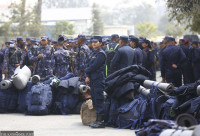National
Rule barring foreign firms in projects below Rs3 billion cost limits competition, stakeholders say
Contractors say the threshold was increased from Rs1 billion to Rs3 billion to benefit select large contractors in a way to promote collusion and to bleed state resources.
Prithvi Man Shrestha
A provision in the newly amended Public Procurement Rule barring foreign contractors from participating in construction projects with the cost less than Rs3 billion has stoked concerns if it could limit competition and promote collusion among big contractors.
The 11th amendment to the Public Procurement Regulation-2007 increased the threshold for construction projects where only domestic competition is allowed to Rs3 billion from Rs1 billion.
Stakeholders and contractors say the reduced competition in large infrastructure projects means only a limited number of big contractors would be able to participate in the bids, which may lead to escalation of building costs.
“There are only around a dozen Nepali contractors who can handle road projects worth Rs3 billion,” said Rabi Singh, president of Contractors’ Association of Nepal (FCAN), a grouping of contractors.
“There are only three-four contractors who can handle building and drinking water projects that meet the new cost limit and only two-three contractors for airport construction of the capacity under the new threshold.”
According to Singh, the amended regulation would not only limit competition but also promote collusion among big contractors to share government contracts.
The Public Procurement Monitoring Office (PPMO), which first drafted the amendment, had proposed increasing the threshold for only domestic competition to Rs2 billion. The Post has obtained a copy of the initial draft.
“We had proposed increasing the threshold to Rs2 billion for domestic competition only because of the increased capacity of Nepali contractors and inflation over the last several years,” said a former PPMO official who has now been transferred to another government office.
PPMO officials say when only a limited number of contractors can work in large packages, they tend to collude among one another, allowing one contractor to get one project in return for another project going to another contractor.
They collude to keep the price at the range of the estimated official cost so that the government agency loses due to a lack of competition among the contractors.
Stakeholders and experts say that the threshold for domestic competition should be increased gradually in line with the capacity enhancement of Nepali contractors.
“I think the government rushed to increase the threshold to Rs3 billion from Rs1 billion, which is a substantial increase,” said Tulasi Sitaula, former secretary at the Ministry of Physical Infrastructure and Transport.
“To ensure healthy competition, there should have been around 50 Nepali contractors who can handle road projects having the cost of Rs3 billion. Currently, the number of such Nepali contractors may range from 15 to 20,” Sitaula said.
Even in 2019, the government had increased the threshold to Rs2 billion through an amendment to the regulation which was later reduced to Rs1 billion through another amendment amid protests from the contractors. Since 2019, the regulation has been amended three times.
The threshold was increased to Rs1 billion from Rs600 million by the fourth amendment to the regulation in 2016. Since the increase, the trend of collusion thrived, according to officials at the PPMO.
In its annual report 2017-18, the procurement monitoring office mentioned possible collusion in the tender for developing Block A of the garment processing zone at Simara between the government agency and the contractors to block foreign builders.
When the consultant prepared the detailed project design, the estimated cost of the package was Rs1.17 billion. But when tenders were called, the estimated cost was reduced to less than Rs1 billion.
Four bidders passed technical qualification to undertake the construction of roads, drainage, sewerage and land work but there were no massive differences in prices quoted by all four bidders against the estimated cost of Rs849.99 million.
A PPMO report titled “A Collection of Reports on Public Procurement Monitoring and Complaints” released in 2018 had also pointed out possible collusion among bidders while participating in and bagging contracts for road and bridge projects in the under-construction Dharan-Chatara-Gaighat-Katari-Sindhuli road and the Galchhi-Trishuli-Mailung-Syabrubesi-Rasuwagadhi road.
According to FCAN President Singh, there is another provision in the regulation that will also limit competition and promote large contractors.
As per the newly amended regulation, a firm becomes eligible for a contract if it has undertaken one similar project with the cost of at least 80 percent of official estimate in the case of a contract worth upto Rs1 billion.
In contracts worth over Rs1 billion, the experience criterion is similar but a contractor should also have accomplished one project worth at least two thirds of the estimated cost and done another project worth over 25 percent of the estimated cost of the project up for bidding.
Singh said that the FCAN had suggested the government seek experiences of accomplishing one project having the cost of 60 percent current estimate or two projects meeting at least 40 percent estimated cost.
“There are many contractors who have the experience of implementing large infrastructure projects,” he said. “Needing experience in a similar project with a cost as much as 80 percent of the estimate will limit competition.”
He alleged that the government introduced these provisions to serve the interest of a few big contractors. “We raised our concern with the prime minister in a meeting with him on Sunday,” said Singh, adding that a national gathering of contractors has been called for March 28.




 16.44°C Kathmandu
16.44°C Kathmandu














